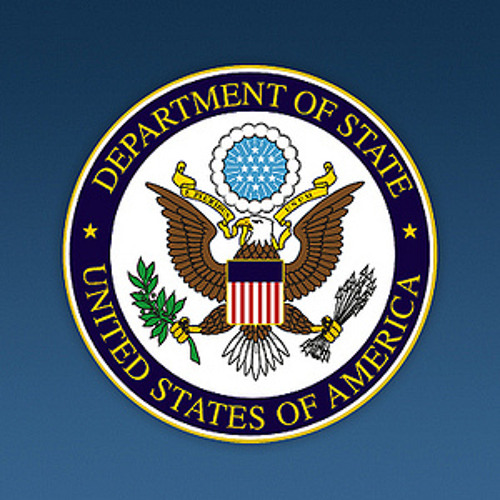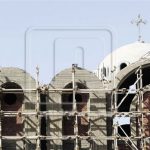By Coptic Solidarity –
May 20, 2021

The US Department of State released its Report on International Religious Freedom on May 12, 2021. This annual report examines the state of religious freedom in every country except the US. Coptic Solidarity recognizes the additional challenges in creating this report due to the COVID-19 global pandemic and commends those involved for their steadfast efforts.
Each year, Coptic Solidarity (CS) provides an analysis of the Egypt chapter including our areas of agreement, constructive criticism, and recommendations for future reports. Please see previous analyses below.
POSITIVES
- The report is thorough and reflects many of the key forms of discrimination Copts and other religious minorities face in Egypt.
- Discusses dangers of requiring religion on national ID cards.
- Includes numerous examples of prisoners of conscience from various faith backgrounds.
- Coptic Solidarity has repeatedly urged that this report include updates from year- to -year regarding those convicted of crimes against Copts and their properties because often those criminals have their sentences changed or revoked, resulting in impunity which has not been reflected in the formatting style. This year, the report includes some critical legal updates such as:
- Souad Thabet, an elderly Coptic woman who in 2016 was stripped naked and paraded through the streets of her village based on a mere accusation against her son of having an affair with a Muslim woman. Mrs. Thabet is still unable to return to her home and the case has been moved around amidst numerous developments. The report notes that the Beni Suef Criminal Court acquitted three of her attackers, depriving her of any justice.
- Cited several instances when police arrested both Copts and Muslims despite Muslims attacking Coptic homes, churches, and individuals.
- Included examples of an oft used tactic by the judicial system to allow attackers of Copts to escape justice, blaming it on psychological problems, as in the case of Catherine Ramzi and the man who threw a Molotov cocktail at the Virgin Mary and the Martyr Church in Alexandria.
- Clearly demonstrates the preference shown to Sunni Islam as compared to the Coptic Church and other minority faith groups in areas such as:
- State funding of al-Azhar at $1.02 billion a year.
- Payment for renovation and building of 300 new mosques within two months, loose regulations to build new mosques, Imams are paid by the state; compare to only 478 existing churches and related buildings receiving (mostly) conditional permits, and only allocated land for 10 new churches in 8 cities, governed by much stricter regulations including needing approval to repair churches unlike mosques.
- The General Egyptian Book Authority banned certain Muslim books (presumably linked to the Muslim Brotherhood) from the Cairo International Book Fair but allowed the sale of The Protocols of the Elders of Zion and Mein Kampf, demonstrating clear bigotry.
- Noting the hypocrisy between President el-Sisi’s speech to cabinet members regarding improving religious freedom and tolerance versus his speech on the Prophet’s birthday in which he said freedom of expression should be limited and that “We have the right for our feelings not to be hurt and for our values not not to be hurt” after cartoons of Mohammed were published in France. His statements directly contradict one another and the right to not having one’s feelings hurt is not an internationally accepted human right, in part because it infringes on the rights of others as is the case for religious minorities in Egypt.
- Previous reports have included statements by Sheikh el-Tayeb and reference to the document he signed with Pope Francis, but this year the report also demonstrated el-Tayeb’s duplicity in that he argued against revisiting and reforming sharia at a conference titled Renovation of Islamic Thought. Coptic Solidarity has repeatedly highlighted el-Tayeb’s conflicting statements and actions such as in our report, A Glimpse into the Mindset of Sheikh Ahmed al-Tayeb, the Grand Imam of al-Azhar.
CONSTRUCTIVE CRITICISM
- Coptic Solidarity has long urged the State Department to acknowledge the trafficking of Coptic women and minor girls in Egypt, which was finally done this year, but – rather astonishingly – in a dismissive manner. Our report, Jihad of the Womb: Trafficking of Coptic Women Girls in Egypt, was referenced but the IRF report said that “government officials, leaders in the Christian community, and NGOs stated that they were skeptical of the classification of the cases as abductions” and that MTGI only reported 13 cases of abductions since October 2019. It is not clear to us why this organization (MTGI) is granted such a credibility over our report. This is an unfortunate downplaying of a well-documented crisis impacting Copts. The majority of cases that Coptic Solidarity included in our report were documented by church leaders and/or family members who publicized them in hopes of getting their daughters/siblings/wives returned. It is particularly insulting to the trafficked victims who are underage (hence “children” according to Egyptian laws) or wives and mothers who were clearly kidnapped. Some of these women were forced to record videos – while wearing hijabs – claiming they had converted to Islam and run away of their own free will.
- The report says that children of individuals who have converted away from Islam have the choice at 18 to choose which faith will be reflected on their ID card. In practice, officials refuse to change an individual’s faith to Christianity on ID cards.
- The statement defining customary reconciliation sessions says that “they do not involve serious crimes such as homicide, serious injury or theft.” But as seen in other examples throughout the report, these sessions are used after larger crimes such as with Christians whose homes were damaged during Muslim rioting (such as the attack on Ms. Souad Thabet.)
- Brief mention was made of imprisoned prominent Coptic activist, Ramy Kamel, but failed to mention the torture he has endured, and that he has been illegally held in solitary confinement for about 18 months. It also should’ve made clear that Kamel’s arrest was a direct retaliation for his cooperation with a UN Special Rapporteur and for exposing discrimination against Copts in Egypt.
- This report has included updates on the number of churches and related buildings approved since the new church law was passed in 2016, but it completely lacks the context which explains how pathetically the law has been implemented and how it has failed to alleviate the lack of churches for Christians. Some additional information that should be included is:
- How many of the approvals are conditional versus final? To date, most approvals are conditional, often imposing onerous conditions on churches that make it difficult to ever receive a final approval. In any case – according to the USCIRF’s latest report – only 32.6% of churches have received some type of preliminary approval.
- Statistics on how many new churches have been approved and actually built, how many churches have been illegally closed, and how many of the new churches are in existing communities (especially in the countryside, where there is still a huge deficit of churches for the Coptic population), versus those approved in new construction zones.
- The annual report continues to provide an explanation and vision of the work of the Family House (Beit al-Ai’ila) as a project to “bring together opposing parties to a sectarian dispute with the goal of restoring communal peace through dialogue.” The Family House should not be considered a legitimate entity in reducing violence or creating greater religious freedom.
- In reality, the Family House was founded by the state’s security apparatus to eschew the government’s responsibility in combatting “religious strife” by projecting the matter as inter-religious disputes to be resolved between Al-Azhar (who has the upper hand) and the Christian Churches.
- As a result, it has been used as a tool for greater repression of the Coptic minority such as through the use of informal reconciliation sessions instead of taking perpetrators to court. As mentioned above, in reality there is no “religious strife,” “inter-communal violence” or “sectarian violence” in Egypt. The violence invariably originates with (fanaticized) Muslims attacking Copts and their properties.
- The Family House has done nothing to facilitate the opening of more churches or to assist with those churches illegally closed in the last few years.
- The Family House is used as a tool to push Coptic businesspeople to pay for repairing attacked churches or compensate Coptic victims rather than having the governorate, or those at fault, covering the expenses.
- The Family House has done nothing to intervene in the many cases of kidnapped Coptic women and underaged girls who are forcibly converted to Islam and often forcibly married. In the recent case of the wife and mother of three girls, Ranya Abd Al-Masih, the Family House did absolutely nothing to assist with her return, despite her husband being an active member. Indeed, in a rare case of showing dissatisfaction openly, the local diocese denounced the Family House in a statement.
- Again, the report mentions claims by the al-Azhar Curricula Development Committee about improvements to textbooks, but Coptic Solidarity has not been able to confirm if anyone has actually seen these books to verify these changes. We have made this recommendation to both the State Department and to the USCIRF to request copies of the textbooks for vetting.
RECOMMENDATIONS
- Urge Egypt to pass a unified houses of worship law or at least complete the entire process of church-authorization (according to the 2016 Church Law) in a specific time window of 12 months.
- It is critical that the Department of State report not follow the Egyptian government’s narrative but rather include the full perspective of systematic and systematic discrimination facing religious minorities in Egypt. Refer to Coptic Solidarity’s newly published FACTS vs. FICTION: Coptic Solidarity’s Fact-Checking of the ‘Religious Freedom and Diversity’ Document Issued by the Embassy of Egypt in the U.S.A which addresses each claim, point by point. This document contains numerous false claims, historical inaccuracies, and overall is highly misleading regarding the true situation for Egypt’s Copts
- Include information on the explicit discrimination against Coptic footballers and athletes who are prevented from playing club level soccer in Egypt. There have not been any Copts representing Egypt in the last two summer Olympics either. Since both FIFA and the IOC claim sport is for all, and athletes should not suffer discrimination, inclusion of sport would be a valuable way to ensure these sporting entities know of the systematic discrimination against players of minority faiths.
- When referencing the National Council for Human Rights, it would be helpful to know if they have ever met and if so, what has this entity done?
ENCLOSURE
- FACTS vs. FICTION: Coptic Solidarity’s Fact-Checking of the ‘Religious Freedom and Diversity’ Document Issued by the Embassy of Egypt in the U.S.A.
- ‘Jihad of the Womb:’ Trafficking of Coptic Women & Girls in Egypt
- 2019 – Annual State Department Report: What Constitutes Improvement for Copts in Egypt?
- 2018 – Annual State Department Report Confirm Systematic Discrimination Against Religious Minorities in Egypt
- 2017 – An Assessment by Coptic Solidarity: State Department 2017 Annual International Religious Freedom Report on Egypt
- 2016 – Coptic Solidarity Analysis and Recommendations on Egypt Chapter of State Department Report
- 2015 – Coptic Solidarity Applauds Egypt Chapter of State Department International Religious Freedom Report and Provides Recommendations
- 2014 – State Department’s Annual IRF Report Claims Improved Status of Copts as Key Positive Development in State of Religious Freedom Worldwide in 2014
Recommended Posts





